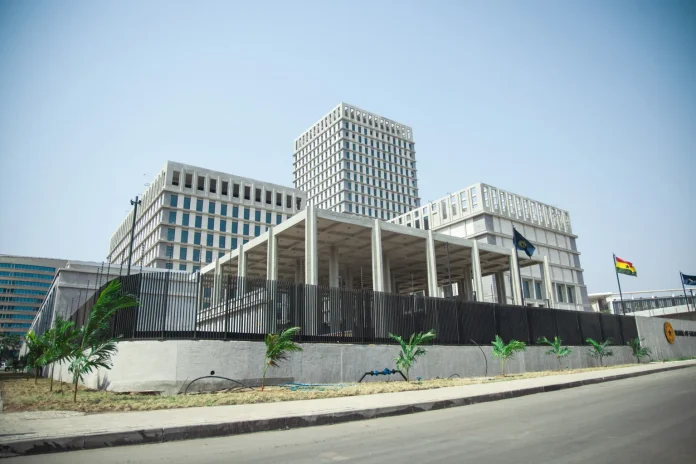
Ghana’s domestic value added tax collections and retail sales recorded substantial growth during the first five months of 2025, indicating renewed consumer confidence and stronger tax compliance according to the Bank of Ghana’s July Monetary Policy Report.
Domestic VAT collections rose 33.6 percent to reach GH¢8.31 billion between January and May 2025, up from GH¢6.22 billion during the corresponding period last year. The increase represents one of the strongest performances in recent years and suggests meaningful economic recovery is taking hold.
Retail sales followed a similar trajectory, climbing 35.7 percent cumulatively over the five-month period. This growth reflects expanding household spending and sustained recovery in private consumption patterns that had been suppressed during earlier periods of economic difficulty.
Breaking down the May figures specifically reveals the momentum’s strength. Year-on-year sales for May alone jumped 38.6 percent to GH¢277.62 million, compared to GH¢200.27 million recorded in May 2024. Even on a month-to-month basis, retail activity advanced 4.6 percent from April’s GH¢265.46 million to May’s GH¢277.62 million.
The central bank attributed these upward trends to enhanced economic activity, stronger consumer confidence, and improved tax administration systems. Each factor has contributed to creating conditions where both government revenue collection and private sector commercial activity can flourish simultaneously.
Domestic VAT for May specifically amounted to GH¢1.77 billion, representing a 30.1 percent year-on-year increase. That single month’s performance underscores how consistently the positive trends have materialized across the measurement period rather than reflecting isolated spikes.
According to Bank of Ghana analysis, the surge in consumer spending reflects gradual rebound in domestic demand supported by relatively stable prices and modest growth in disposable incomes. When households feel more secure about their financial situations and when inflation remains manageable, spending naturally increases as people make purchases they’d previously deferred.
The retail sales growth carries particular significance because it demonstrates that consumers aren’t simply paying higher prices for the same volume of goods. Instead, they’re actually purchasing more, which drives business activity, creates employment opportunities, and generates the tax revenue governments need to fund public services.
Economic analysts viewing these figures believe they suggest a more buoyant domestic economy than existed throughout 2024, following months of macroeconomic stability and a strengthening cedi. The national currency’s performance has been crucial, as a stable or appreciating cedi helps control import costs and preserves household purchasing power.
However, these same analysts caution that sustaining this growth momentum will depend heavily on government’s ability to maintain fiscal discipline, manage inflationary pressures, and strengthen measures that protect household purchasing power. Progress can be reversed quickly if policy missteps undermine the confidence that’s currently supporting increased consumer activity.
The improved VAT collection figures also reflect enhanced tax administration capabilities at the Ghana Revenue Authority. Better compliance doesn’t happen accidentally; it requires systems that make it easier for businesses to fulfill their obligations while also making it harder to evade responsibilities. The GRA has been implementing various digital initiatives designed to close loopholes and broaden the tax net.
These collection improvements matter tremendously for government finances, particularly as Ghana works to consolidate its fiscal position following recent economic challenges. Higher VAT revenue provides resources for essential public services without requiring new tax increases that might dampen the consumer spending that’s currently driving growth.
The Bank of Ghana’s report noted that while data clearly shows recovery in consumer activity, continued policy consistency and private sector support will be essential to consolidate gains and drive broad-based growth. One-off improvements mean little if they can’t be sustained and built upon through successive periods.
Private consumption represents a substantial component of Ghana’s gross domestic product, meaning retail sales performance directly influences overall economic growth rates. When households are spending confidently, businesses expand operations, hire workers, and make investments that compound positive economic effects.
The 35.7 percent cumulative retail sales increase over five months suggests consumers aren’t just making essential purchases but are also buying discretionary items that reflect improved confidence about future economic conditions. People delay non-essential spending when they’re worried about income security or expect prices to rise dramatically.
Comparisons to 2024 performance highlight how significantly conditions have improved. Last year’s figures reflected an economy still grappling with various pressures including elevated inflation, currency depreciation concerns, and debt restructuring processes that created uncertainty for businesses and households alike.
The strengthening cedi mentioned by analysts has played multiple beneficial roles. It helps control inflation by making imports less expensive in local currency terms, it preserves the value of incomes and savings, and it creates confidence that encourages both consumption and investment decisions.
May’s 4.6 percent month-on-month retail sales increase indicates that momentum continued building even within the measurement period itself. Had growth simply reflected base effects from weak 2024 performance, one might expect flattening or declining month-to-month figures once the year-on-year comparisons looked strong.
Tax compliance improvements likely stem from multiple sources beyond just better GRA systems. When economic conditions improve, businesses naturally generate more revenue that creates VAT obligations. Additionally, formalization of previously informal economic activities brings more transactions into the tax net organically.
The challenge facing policymakers now involves maintaining the conditions that have enabled this positive performance while avoiding actions that might disrupt the recovery. This requires balancing fiscal needs against the imperative to keep taxes at levels that don’t discourage consumer spending or business investment.
Looking ahead, sustaining 30-plus percent growth rates will become mathematically more difficult as the base figures rise. However, even moderation to 15 or 20 percent growth would still represent healthy expansion that supports broader economic objectives.
